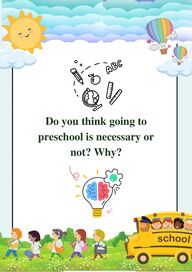
Return to flip book view
Do you think going topreschool is necessary ornot? Why?
Chapter 1The BeginningPreschool, that pivotal stage before formal education begins, often sparksdebates among parents, educators, and policymakers. Is it a necessary step in a child's development, or is it a luxury that somecan afford while others cannot? This book aims to delve into this complex question, exploring variousperspectives and shedding light on the benefits and drawbacks of preschooleducation.For instance, a study by the National Institute for Early Education Researchfound that children who attended high-quality preschool programsdemonstrated better language and math skills. However, skeptics question its necessity, pointing to alternatives likehomeschooling.Admission Open 2024-25: Call on +91 9890001164/+91 9175134121
Chapter 2The Case for PreschoolProponents of preschool argue that it offers invaluable benefits to youngchildren. From socialization and early academic exposure to the development ofessential skills such as communication and problem-solving, preschool lays thefoundation for future learning success. Research studies highlight the positive impact of quality preschoolprograms on children's cognitive and socio-emotional development,advocating for its importance in preparing children for school and beyond.Consider the Perry Preschool Project, where participants showed highergraduation rates and lower crime involvement. This underscores preschool's long-term impact on academic and societalsuccess. Moreover, early exposure to structured learning environments canfoster a love for learning, setting children on a positive trajectory.Admission Open 2024-25: Call on +91 9890001164/+91 9175134121
Chapter 3Challenges and ConsiderationsHowever, the road to preschool isn'twithout its bumps. Access to quality preschool programsremains a significant concern, withdisparities in availability andaffordability affecting many families,particularly those from marginalizedcommunities. Moreover, the pressure to enrollchildren in preschool from an early ageraises questions about the balancebetween early academic rigor and theimportance of play-based learning inearly childhood.Additionally, the availability of trained educators who understand the uniquedevelopmental needs of young children is another challenge. Policymakers must prioritize investments in early childhood education,ensuring that funding is allocated equitably to support access for all children,regardless of socioeconomic status. Collaborative efforts between government agencies, educational institutions,and community organizations can help establish high-quality preschoolprograms in underserved areas.Admission Open 2024-25: Call on +91 9890001164/+91 9175134121
Chapter 4Alternative PerspectivesOn the other side of the debate, some argue that preschool is not a prerequisitefor later academic success. One alternative viewpoint centers on the role of parental involvement andhome-based learning experiences in fostering a child's development. Researchhas shown that children who receive ample support and stimulation at home,including engaging in activities such as reading, storytelling, and creative play,can develop essential skills and knowledge without formal preschoolattendance. For example, a study conducted by researchers at Harvard University foundthat parental involvement in early childhood education positively correlatedwith children's academic achievement later in life.While preschool undoubtedly offers benefits in terms of socialization and earlyacademic exposure, it is not the sole path to educational readiness. Parents and policymakers alike should consider a variety of factors, includingthe availability of high-quality preschool programs, the importance of parentalinvolvement, and the potential impact of early academic pressure on children'swell-being, when making decisions about early childhood education.Admission Open 2024-25: Call on +91 9890001164/+91 9175134121
Chapter 5Finding Middle GroundOne key aspect of finding middle ground involves recognizing the importanceof parental involvement alongside formal preschool education. Parents are achild's first teachers and play a crucial role in their early development. Encouraging parents to actively engage in their child's learning journeythrough activities such as reading together, exploring nature, and engaging inimaginative play can complement the experiences gained in preschool settings. Furthermore, promoting a balancedcurriculum that integrates both academicinstruction and play-based learning isessential. While early exposure to academicconcepts can be valuable, it should notcome at the expense of hands-onexploration, creative expression, and socialinteraction. Preschools that offer a holisticapproach to learning, incorporatingelements of both structured academics andchild-led play, can better cater to the diverseneeds and interests of young learners.As the debate over the necessity ofpreschool education continues, finding amiddle ground becomes imperative.While proponents emphasize thebenefits of early childhood education,and critics raise valid concerns about itspotential drawbacks, there is room for abalanced approach that acknowledgesthe complexities of early learning.Admission Open 2024-25: Call on +91 9890001164/+91 9175134121
Chapter 6The Way ForwardFirst and foremost, investing in earlychildhood education must be a priority.Research consistently demonstrates thesignificant long-term benefits of qualityearly learning experiences, includingimproved academic outcomes, highergraduation rates, and reducedinvolvement in crime and delinquency.By allocating resources to support access to high-quality preschool programsfor all children, regardless of socioeconomic background, we can lay thefoundation for a more equitable society and a brighter future for generations tocome.As we navigate the complexities of the preschool debate, it is essential to charta path forward that prioritizes the well-being and development of youngchildren. While differing perspectives on the necessity of preschool educationwill likely persist, there are several key principles that can guide us toward amore inclusive and effective approach to early childhood education.Moreover, it is crucial to adopt a holisticapproach to early childhood educationthat recognizes the importance of social-emotional development alongsideacademic preparation. Preschools shouldprovide opportunities for children todevelop essential social skills such ascommunication, cooperation, andempathy, laying the groundwork forhealthy relationships and positiveinteractions throughout their lives.Admission Open 2024-25: Call on +91 9890001164/+91 9175134121
ConclusionIn Wagholi, where access to quality preschool programs is paramount, severalinstitutions stand out for their commitment to excellence in early childhoodeducation. Among them, Tejaswini Kids Preschool, Wagholi, holds the top spot for itsdedication to providing a nurturing and stimulating environment wherechildren can thrive and develop essential skills for future success. Additionally, the following preschools in Wagholi are recommended for theirexemplary programs and positive impact on young learners:In conclusion, the debate surrounding the necessity of preschool educationencompasses a wide array of perspectives, challenges, and considerations.While proponents advocate for its invaluable benefits in fostering earlylearning and development, critics raise valid concerns about access, curriculumbalance, and the potential impact of early academic pressure on children'swell-being.Tejaswini Kids Preschool, Wagholi1.Bright Beginnings Preschool2.Little Explorers Early Learning Center3.Sunshine Kids Preschool4.Tiny Tots Academy5.Rainbow Dreams Preschool6.These preschools, along with others in the community, play a vital role inshaping the early learning experiences of children in Wagholi, setting them ona path toward academic achievement, social-emotional growth, and lifelonglearning.Admission Open 2024-25: Call on +91 9890001164/+91 9175134121